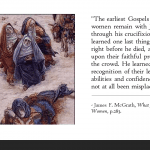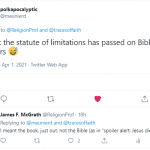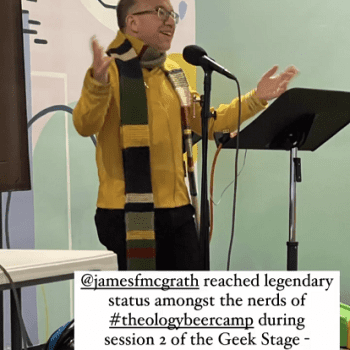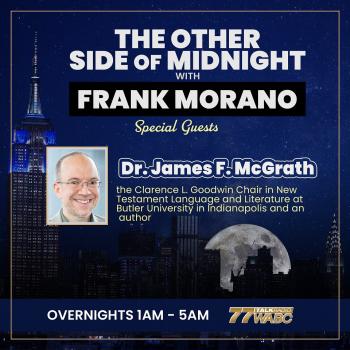Good Friday represents the end of the story a historian can tell about Jesus as a historical figure. He lived, he was executed, he was placed in a tomb. Historians can elaborate on these points and many others in important ways, but cannot take us further.
Historians can help us study what early Christians believed about Jesus in the days and years that followed. Historical study is relevant to understanding the earliest Easter beliefs, but cannot give us Easter as an event. A unique moment in history, the dawn of the Kingdom of God, the arrival of the resurrection age – these are by definition not the kinds of things historians can examine using the tools of their discipline and judge probable, never mind certain. Yet many Christians want not merely Easter faith but Easter certainty.
Holy Saturday is always a good time to reflect on this. Whether the topic is history, science, or anything else, we should seek out the best evidence we can, and the best interpretation of it that we can, as far as these will take us.
The question that Christians should bring to Easter is where we go from there. Can we go from there, and if so how?
Yesterday was a good day to set aside for reflecting on those questions. Those of us who have experienced the loss of old “certainties” have experience with this. What we lost, in fact, was in no instance a certainty, but a feeling of certainty about something about which we should never have felt that way.
A key question is whether we make the mistake of looking for new certainties of the same sort, other intellectual propositions that we can assent to and know that we are right.
That won’t take us to Easter. That will take us away from the tomb in other directions. It may take us to Galilee to return to the certainty of fishing. It may take us to Emmaus to figure out what to do with our lives.
The earliest Easter stories are full of doubts and puzzles, struggles and challenges, rather than certainties.
But they are also full of hope.
I think one reason why many Christians get Easter wrong is because the context has been forgotten. Belief in the resurrection of Jesus wasn’t something that could be isolated either from the immediate context of his humiliating execution, nor from the broader context of Jewish belief in resurrection as the form afterlife would take when God brought human history to a close as it had persisted up until that point and instituted a new era in which justice prevailed. When Jews first developed the idea in response to the persecution they were subjected to by the Syrian king Antiochus IV, it was an affirmation that justice would ultimately prevail.
That wasn’t certainty. It was hope, a conviction that was under no illusion that the evidence in the world at that moment cast serious doubt upon it and called it into question.
When Theodore Parker said words about slavery and its abolition that Martin Luther King Jr. later echoed and made more famous, he was expressing something similar. “I do not pretend to understand the moral universe; the arc is a long one, my eye reaches but little ways; I cannot calculate the curve and complete the figure by the experience of sight; I can divine it by conscience. And from what I see I am sure it bends towards justice.” Parker wasn’t affirming a certainty, much less one based on something supernatural. His being “sure” was conviction and hope. It was determination to live as though something possible and future is trustworthy, because the alternative is hopelessness, meaninglessness, and despair. The slaves and civil rights activists who spoke of the Promised Land were not expecting a sea to part in cinematic fashion. The moral arc of the universe does not bend while we stand idly by waiting for it to happen.
The earliest Christian Easter faith is a conviction that ultimately justice will prevail. It was an expression of their Jewish faith, applied to one that they saw as righteous, embodying goodness, embracing and teaching love for enemies, one who welcomed the outcast and advocated for the lifting up of the downtrodden and oppressed. God vindicated Jesus. He must have, not because they saw him in a way that could not be doubted, not because they failed to find his body in a way that could be otherwise explained. It was a certainty because the alternative was despair in the face of victorious evil, of might that really does make right.
The reason Jesus must live beyond the grave is the same reason that slavery must end, racism shall be rooted out, oppression shall cease, justice shall roll down like waters. “Death shall have no dominion” is not blind naivete ignoring reality. It is a hand placed on the plow that refuses to look back. It is a determination to stand when all others bow before the dictator. It is the courage to ask the hard questions and live with uncertainty. It is saying Black Lives Matter not because they do to everyone but they do to you and should to everyone. Resurrection is not something you prove through arguments any more than the value of human beings’ lives is, for ultimately both of these are ways of saying that human lives matter in the grand scheme of things in ways that we emphatically do not see consistently, daily, in the world we live in. Resurrection is something you affirm by living and speaking justice, by living as though the moral arc of the universe bends towards the Kingdom of God, and pulling it a little further in that direction by doing so.
—
For those who may be interested, I explore the relationship between history and faith in connection with the crucifixion of Jesus, his burial, and Easter faith in my book The Burial of Jesus.














